As a radio station sales manager, it was challenging to find people who could sell.
Salespeople at our small radio station in Fond du Lac, Wisconsin either couldn’t sell or were quickly pilfered to work in bigger markets if they could.
Searching for high-performing salespeople was a constant focus. To hire correctly I needed to know the type of person I wanted, and whether they could sell.
It didn’t take long to determine the “type of person” I wanted and how to identify them. Discovering whether a candidate could sell took several years. (To find top-performing sales candidates I recommend https://www.advancedhiring.com/)
First Who, then What
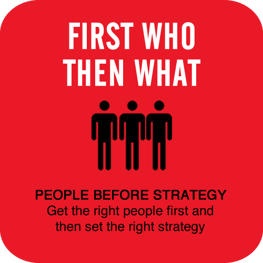 How do you hire at your business? Do you have a unique hiring system to help you determine the right people for your organization?
How do you hire at your business? Do you have a unique hiring system to help you determine the right people for your organization?
Jim Collins Good to Great, “First Who, then What” maxim states nothing is more important than getting the right people on the bus.
If you don’t have a vision of Who to hire, determine this immediately.
Danny Meyer, in Setting the Table: The Transforming Power of Hospitality in Business, has a clear vision of his perfect employee.
49% Task, 51% Feeling Hiring Rule.
Meyer first learned this concept of “51 percent” from Rich Melman, a restauranteur from Chicago, who he visited in the late 1980s.
Union Square Hospitality Group staff performance reviews weigh technical job performance: perform their duties (49 percent) and emotional job performance: how staff members relate to others on a personal level (51 percent).
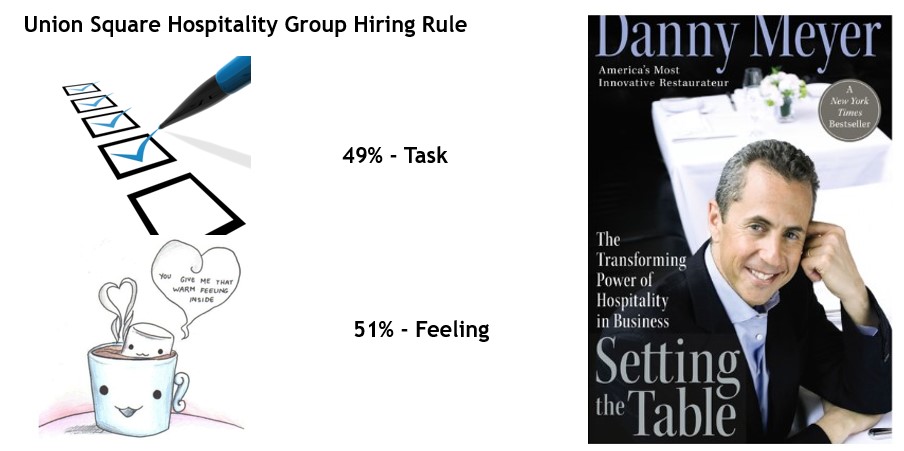 Far more important than skills, Meyer always values the goodness of a person.
Far more important than skills, Meyer always values the goodness of a person.
Here’s how he explains this.
Moths
Imagine if every business were a lightbulb. The primary goal for each lightbulb is to attract the most moths possible.
You discover, 49 percent of the reason moths are attracted to a bulb is for the quality of its light (brightness being the task of the bulb) and 51 percent of the attraction is to the warmth projected by the bulb (heat being connected with the feeling of the bulb).
Many businesses shine brightly, master the tasks, yet emanate the warmth of a cool fluorescent light.
A flawless four-star restaurant can attract less loyal fans than a two-or three-star place with soul.
In business, Meyer wants to be overcome with moths. Union Square Hospitality Group staff must be like a scintillating string of one-hundred-watt lightbulbs, whose product is the sum of 51 percent feeling and 49 percent task.
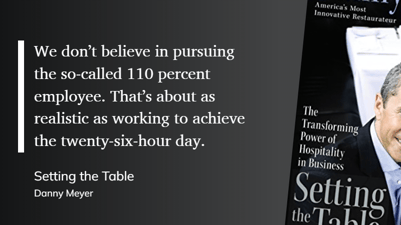 Meyer believes business owners should pack their team with 51 percenters because training in the technical aspects comes far more easily.
Meyer believes business owners should pack their team with 51 percenters because training in the technical aspects comes far more easily.
Hiring 51 percenters today saves training time and dollars tomorrow. Another benefit: they are commonly the best recruiters for others with strong emotional skills.
Nice people love the idea of working with other nice people.
Excellence Reflex
Danny Meyer hires people who possess an emotional skill that chef Michael Romano calls the excellence reflex.
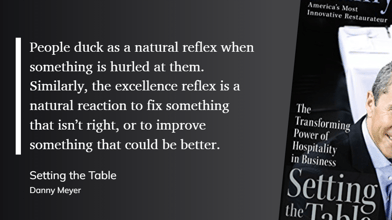 People duck as a natural reflex when something is hurled at them. Similarly, the excellence reflex is a natural reaction to fix something that isn’t right or to improve something that could be better.
People duck as a natural reflex when something is hurled at them. Similarly, the excellence reflex is a natural reaction to fix something that isn’t right or to improve something that could be better.
The excellence reflex is rooted in instinct and upbringing, and constantly honed through awareness, caring, and practice.
The overarching concern to do the right thing well isn’t something you can train for. It’s there or it isn’t.
You need to train how to hire for it.
Union Square Hospitality Group hopes to develop 100 percent employees whose skills are divided 51-49 between emotional hospitality and technical excellence.
To be champions in the team sport of hospitality Meyer’s 51 percenter have six core emotional skills: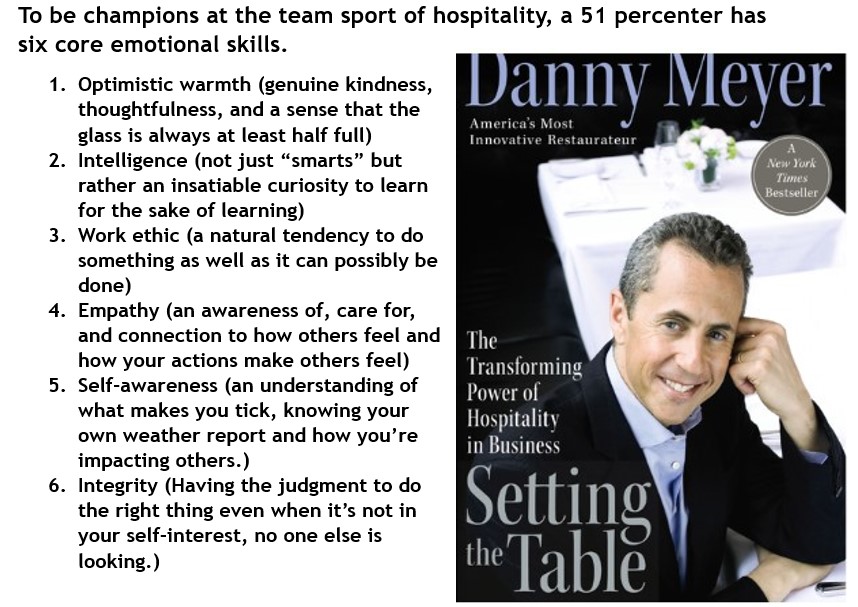
- Optimistic warmth (genuine kindness, thoughtfulness, and a sense that the glass is always at least half full)
- Curious Intelligence (not just “smarts” but rather an insatiable curiosity to learn for the sake of learning)
- Great work ethic (a natural tendency to do something as well as it can possibly be done)
- Empathy (an awareness of, care for, and connection to how others feel and how your actions make others feel)
- Self-awareness (an understanding of what makes you tick, knowing your own weather report, and how you’re impacting others.
- Integrity (Having the judgment to do the right thing even when it’s not in your self-interest, no one else is looking.)
Danny Meyer knows exactly who he wants to work for his business. How clear is your vision of your “Right People?”
How well does your hiring process get them onboard?
Need help?
To create an environment where everyone is inspired to give their best, contact Positioning Systems today to schedule a free exploratory meeting.
Growth demands Strategic Discipline.
-1.png?width=326&height=189&name=1%25%20Plan%20=%2099%25%20Behavior%201%25%20Plan%20=99%25%20How%20(Reality)-1.png) A customer I worked with for four years recently shared how their business is on course to double revenue from 2020. They’d previously quadrupled revenues during the 4 years I worked with them. Next blog, why your business focus should be 1% Plan, 99% Behavior.
A customer I worked with for four years recently shared how their business is on course to double revenue from 2020. They’d previously quadrupled revenues during the 4 years I worked with them. Next blog, why your business focus should be 1% Plan, 99% Behavior.
Building an enduring great organization requires disciplined people, disciplined thought, disciplined action, and superior results, to produce a distinctive impact on the world.
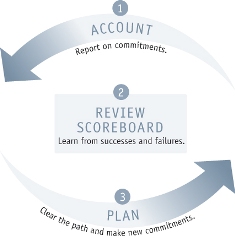 Discipline sustains momentum, over a long period of time, laying the foundations for lasting endurance.
Discipline sustains momentum, over a long period of time, laying the foundations for lasting endurance.
A winning habit starts with 3 Strategic Disciplines: Priority, Metrics, and Meeting Rhythms. Forecasting, accountability, individual, and team performance improve dramatically.
Meeting Rhythms achieve a disciplined focus on performance metrics to drive growth.
Let Positioning Systems help your business achieve these outcomes on the Four most Important Decisions your business faces:
|
DECISION |
RESULT/OUTCOME |
|
PEOPLE |
|
|
STRATEGY |
|
|
EXECUTION |
|
|
CASH |
|
Positioning Systems helps mid-sized ($5M - $500M+) businesses Scale-UP. We align your business to focus on Your One Thing! Contact dwick@positioningsystems.com to Scale Up your business! Take our Four Decisions Needs Assessment to discover how your business measures against other Scaled Up companies. We’ll contact you.
NEXT BLOG – 1% Plan, 99% Behavior..png?width=1479&height=866&name=1%25%20Plan%20=%2099%25%20Behavior%201%25%20Plan%20=99%25%20How%20(Arrow).png)






.jpeg?width=150&height=135&name=Hand%20with%20marker%20writing%20the%20question%20Whats%20Next_%20(1).jpeg)

